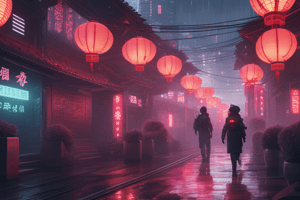Podcast
Questions and Answers
What sentiment do people associate with the Ching Ming Festival?
What sentiment do people associate with the Ching Ming Festival?
People associate the Ching Ming Festival with nostalgia for their past families.
What was the Dragon Boat Festival originally associated with?
What was the Dragon Boat Festival originally associated with?
The Dragon Boat Festival was originally a totem sacrifice festival for tribes worshipping the dragon totem.
How did the Dragon Boat Festival come to commemorate Qu Yuan?
How did the Dragon Boat Festival come to commemorate Qu Yuan?
It commemorates Qu Yuan after he committed suicide in the Miluo River during the Warring States Period.
What custom is associated with the Qixi Festival, and what legend is it linked to?
What custom is associated with the Qixi Festival, and what legend is it linked to?
What does the roundness of the moon symbolize during the Mid-Autumn Festival?
What does the roundness of the moon symbolize during the Mid-Autumn Festival?
What activities are traditionally celebrated during the Double Ninth Festival?
What activities are traditionally celebrated during the Double Ninth Festival?
What solar term does the Winter Solstice mark in the Chinese lunar calendar?
What solar term does the Winter Solstice mark in the Chinese lunar calendar?
Why is the Mid-Autumn Festival significant in various East and Southeast Asian countries?
Why is the Mid-Autumn Festival significant in various East and Southeast Asian countries?
What is the significance of the Spring Festival in Chinese culture?
What is the significance of the Spring Festival in Chinese culture?
Which ethnic groups participate in the Spring Festival celebrations?
Which ethnic groups participate in the Spring Festival celebrations?
How does the Lantern Festival relate to the lunar calendar?
How does the Lantern Festival relate to the lunar calendar?
What traditional activities are associated with the Lantern Festival?
What traditional activities are associated with the Lantern Festival?
What is the historical origin of the Ching Ming Festival?
What is the historical origin of the Ching Ming Festival?
What custom remains today during the Ching Ming Festival?
What custom remains today during the Ching Ming Festival?
When is the Ching Ming Festival typically celebrated?
When is the Ching Ming Festival typically celebrated?
Why do people return to their hometown during the Spring Festival?
Why do people return to their hometown during the Spring Festival?
Flashcards are hidden until you start studying
Study Notes
Spring Festival
- Most significant traditional festival in China, celebrated by Han and ethnic minority groups.
- Involves various celebrations with strong ethnic characteristics.
- Family reunions are central; people travel long distances to return home.
- Reflects anticipation for the New Year and conveys heartfelt emotions.
- Regarded as both a festival and a spiritual foundation for the Chinese nation.
Lantern Festival
- Marks the first major festival following the Spring Festival.
- Celebrated on the first full moon night of the lunar calendar, known as "Yuan" month.
- Originated over 2,000 years ago during the Qin Dynasty.
- Traditional activities include moon admiring, lamp lighting, riddle guessing, and communal eating.
- Enhancements over time feature folk performances like dragon and lion dances, stilt walking, and drumming.
Ching Ming Festival
- Evolved from the Cold Dish Festival, where candles were not lit, and only cold food was consumed.
- Associated with tomb-sweeping, where families visit and pay respects to the deceased.
- Celebrated in April, signifies the arrival of spring and renewal of life.
- Evokes nostalgia, as it honors past family members while fostering enjoyment of nature.
Dragon Boat Festival
- Originated as a totem sacrifice for dragon worship in ancient Baiyue tribes.
- Observed on the fifth day of the fifth lunar month, linked to early dragon boat races.
- Commemorates the poet Qu Yuan, who died by suicide in the Miluo River, emphasizing loyalty and patriotism.
- Regional variations also honor figures like Wu Zixu and Cao E.
Qixi Festival
- Traditional celebration on the seventh day of the seventh lunar month, first observed in the Han Dynasty.
- Connected to women's prayers for wisdom, symbolizing nature worship and needlework skills.
- Features the love story of the Cowherd and the Weaver Girl, representing romance.
- Customs include needle piercing, displaying flowers, and various offerings, influencing neighboring cultures like Japan and Vietnam.
Mid-Autumn Festival
- Established in the early Tang Dynasty and gained popularity during the Song Dynasty.
- Symbolizes family reunion through moon symbolism.
- Customs include moon worship, mooncake consumption, and enjoying osmanthus, an enduring tradition in Chinese culture.
- Festivities also recognized in East and Southeast Asian countries with Chinese heritage.
Double Ninth Festival
- Celebrated on the ninth day of the ninth lunar month, involving activities for autumn viewing and appreciation.
- Common practices include climbing heights for vistas, chrysanthemum watching, eating Chongyang cake, and consuming chrysanthemum wine.
Winter Solstice
- A significant solar term in the Chinese lunar calendar, traditionally observed for over 2,500 years.
- Highlights the importance of solar observation systems established during the Spring and Autumn Period.
Studying That Suits You
Use AI to generate personalized quizzes and flashcards to suit your learning preferences.




